Free Health Care Directive Georgia Template in PDF
In Georgia, the Health Care Directive form empowers individuals to outline their medical care preferences in the unfortunate event they cannot make decisions for themselves. This document, a cornerstone of preemptive health planning, enables Georgians to designate a trusted person, known as a health care agent, to make medical decisions on their behalf. Beyond specifying a surrogate, the form allows for detailed preferences regarding treatments individuals wish to receive or avoid, including decisions about life-sustaining measures. It stands as a critical tool for ensuring personal wishes are honored and facilitates clear communication between health care providers, patients, and families, minimizing the scope for confusion or disagreement during stressful times. Moreover, this form encompasses considerations for organ donation, signaling a holistic approach to end-of-life planning. The adoption of a Health Care Directive is not just about preparing for the worst; it's about taking control of your health care journey and ensuring decisions reflecting one’s values and desires guide it.
Form Sample
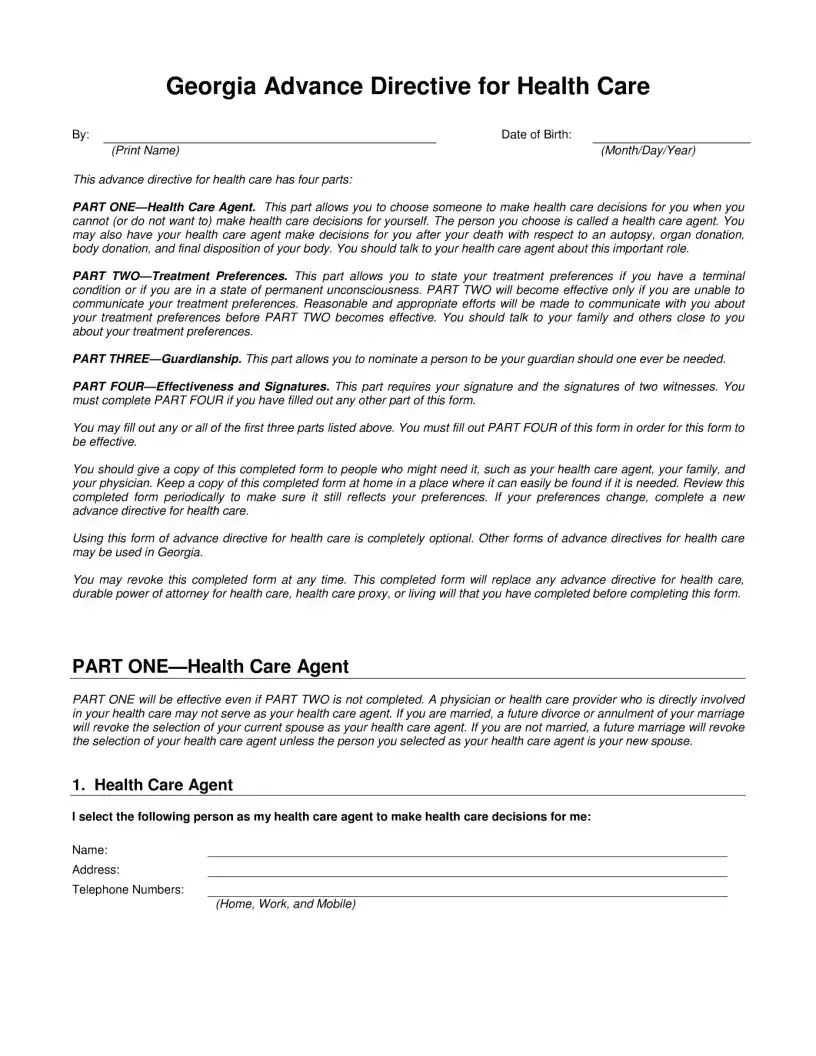
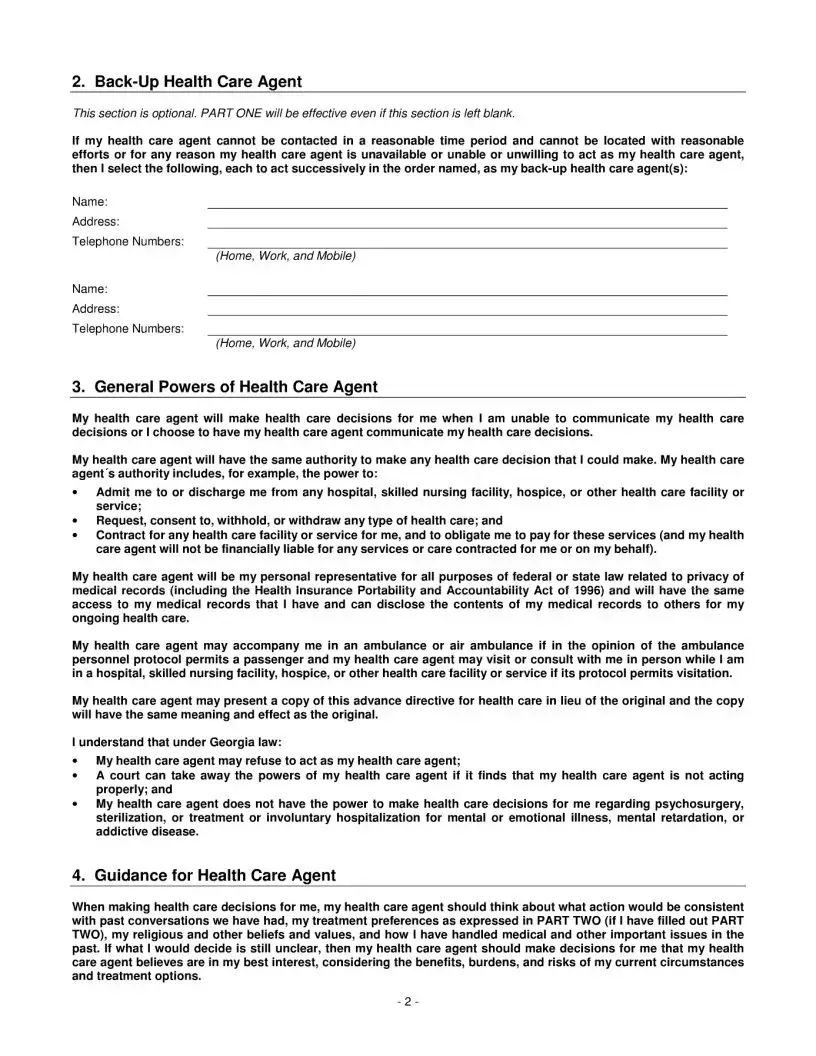
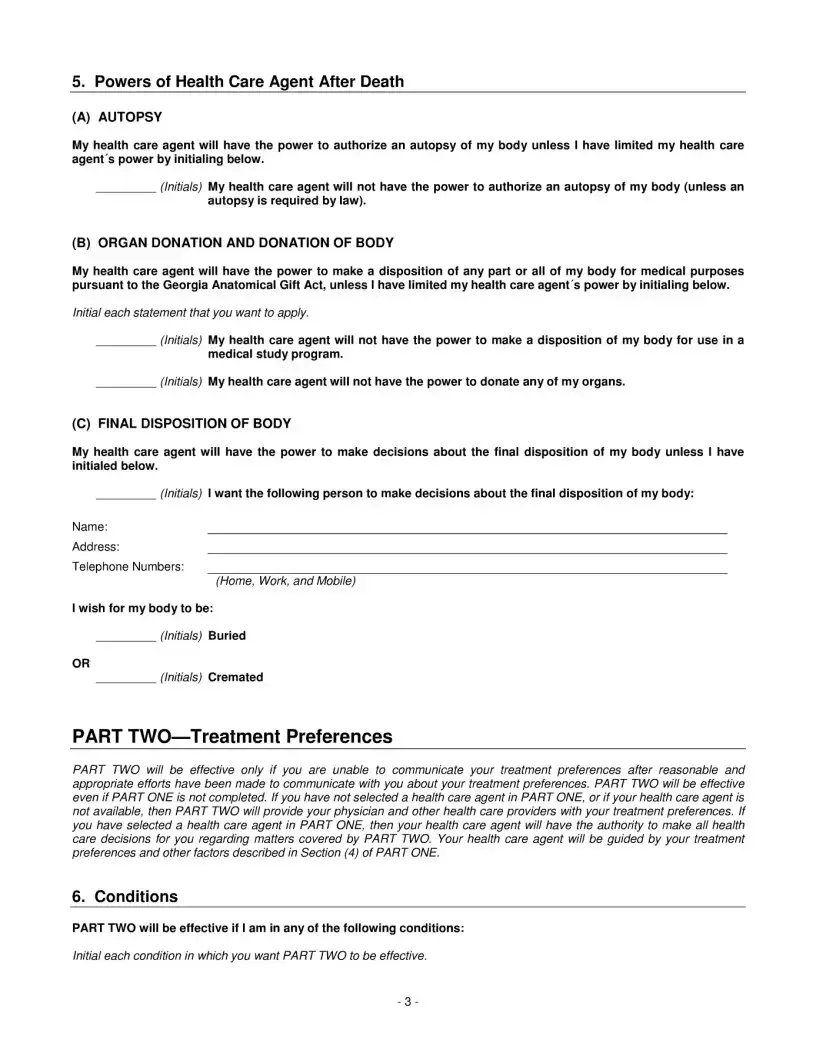
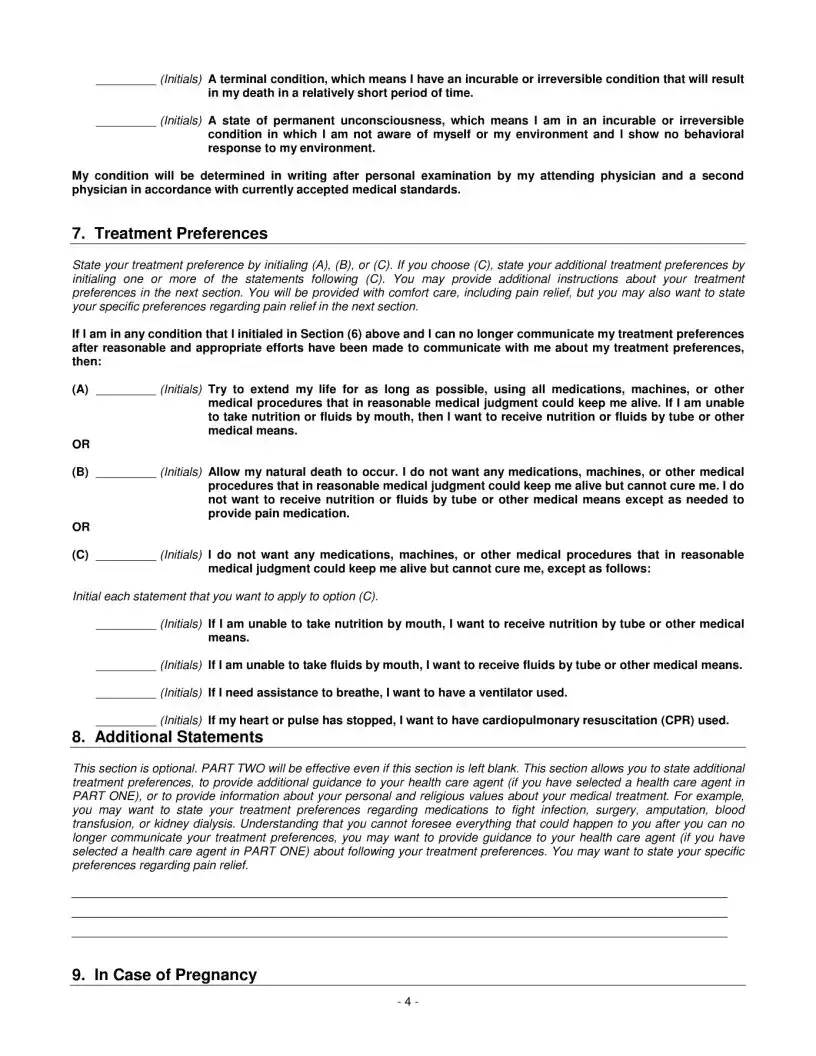
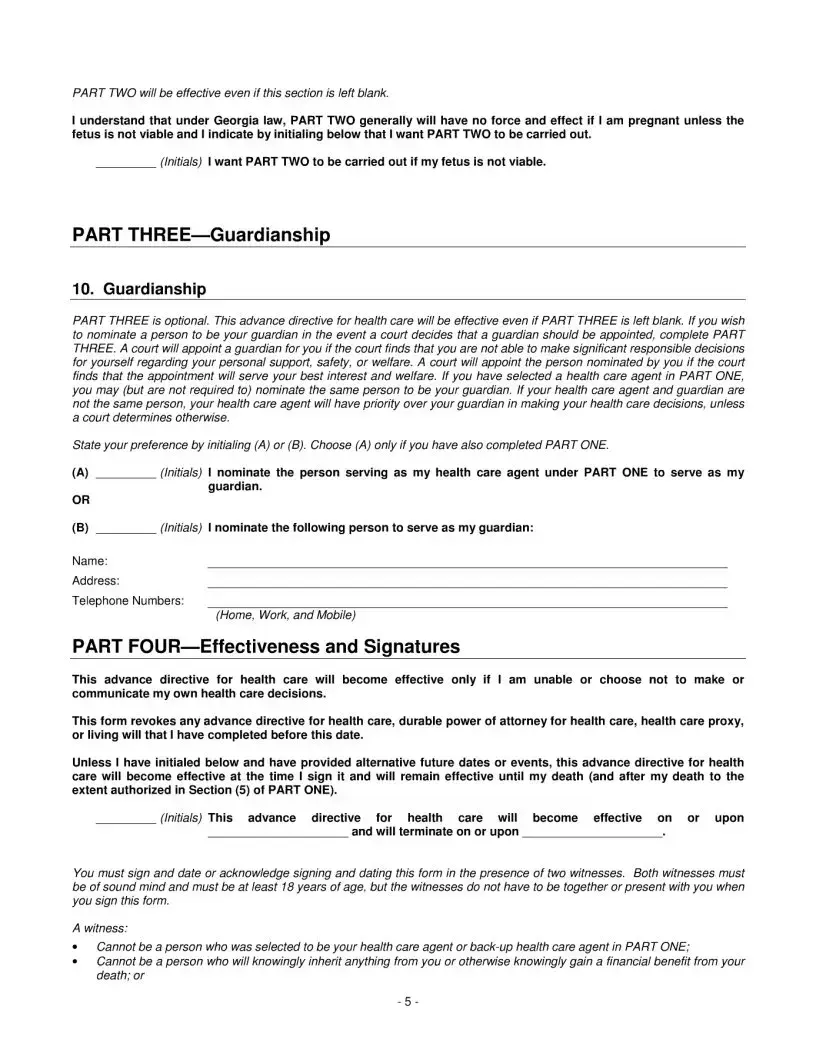
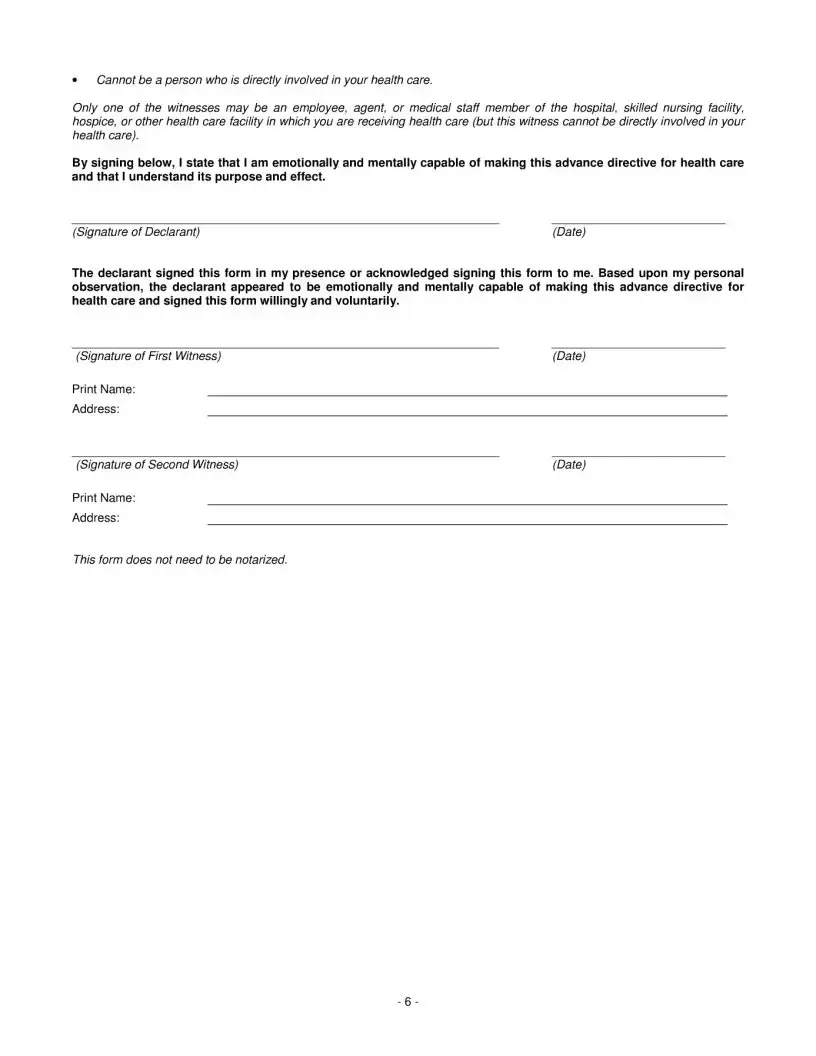
File Overview
| Fact Name | Description |
|---|---|
| Governing Law | The Georgia Advance Directive for Health Care is governed by the Georgia Advance Directive for Health Care Act, O.C.G.A. §§ 31-32-1 to 31-32-14. |
| Purpose | This form allows individuals to appoint a health care agent to make decisions on their behalf if they are unable to do so and to specify their preferences for certain types of medical care. |
| Components | The form consists of two main parts: the designation of a health care agent, and the treatment preferences section, which is often referred to as a living will. |
| Witness Requirement | The form must be signed by the individual creating the directive and witnessed by two individuals who are not the appointed health care agent or related to the individual by blood or marriage. |
| Revocation | The individual can revoke the directive at any time, regardless of their physical or mental condition, by notifying their health care agent or health care provider either verbally or in writing. |
Guide to Using Health Care Directive Georgia
Completing a Health Care Directive in Georgia is a responsible step toward ensuring your health care preferences are known and respected in the event that you're unable to express them yourself. This process allows individuals to document their wishes regarding medical treatment and appoint a health care agent to make decisions on their behalf if necessary. The instructions below aim to guide you through the process of filling out a Georgia Health Care Directive form thoroughly and accurately.
- Begin by reading the entire form carefully to understand the significance of each section and the types of decisions that may need to be made.
- Fill in your full legal name, date of birth, and address at the top of the form to clearly identify yourself as the principal (the person creating the directive).
- Appoint a Health Care Agent by writing the full name, address, and contact details of the person you trust to make health care decisions for you if you're unable to do so. It's important to discuss this with them beforehand to ensure they're willing and prepared to take on this responsibility.
- If desired, appoint an alternate agent in the same manner. This person will step in if your primary agent is unavailable or unwilling to act on your behalf.
- Specify your health care desires in the section regarding treatment preferences. This includes decisions about life support, resuscitation, and pain management. Be as clear and detailed as possible to provide guidance for your health care agent and medical providers.
- Determine the extent of the powers granted to your health care agent. You can allow them full decision-making authority or limit their powers to certain types of decisions. Be very specific about what your agent can and cannot do on your behalf.
- If applicable, include any wishes you have regarding organ donation. You may specify whether you wish to donate any organs or tissues for transplant, research, or educational purposes.
- Sign and date the form in the presence of two witnesses, who must be adults and should not be the person you have designated as your agent. Georgia law requires these witnesses to sign the document as well, attesting that you are of sound mind and signing the directive voluntarily.
- If possible, it is also recommended to have the form notarized to further authenticate your identity and the witnesses' signatures.
- Finally, inform your health care agent, family, and primary health care provider of your completed Health Care Directive. Provide them with copies and consider keeping the original in a safe and accessible place.
Completing a Health Care Directive is a significant step in health care planning that can provide peace of mind for you and your loved ones. By following these steps, you can help ensure that your health care wishes are known and can be followed by those caring for you, making difficult times a little easier for everyone involved.
Obtain Clarifications on Health Care Directive Georgia
-
What is a Health Care Directive in Georgia?
A Health Care Directive in Georgia, often referred to as an advance directive, is a legal document that allows individuals to outline their preferences for medical treatment in the event they become unable to communicate their decisions due to illness or incapacity. It encompasses two primary components: a Living Will, where one can specify their wishes for end-of-life care, and a Health Care Power of Attorney, which designates a trusted person to make medical decisions on their behalf.
-
Who should have a Health Care Directive in Georgia?
Every adult residing in Georgia who wishes to have control over their medical treatment should consider creating a Health Care Directive. This document is especially crucial for individuals with strong preferences about health care interventions or those with specific medical conditions that might impair their ability to make decisions in the future.
-
How can I create a Health Care Directive in Georgia?
To create a Health Care Directive in Georgia, you must complete the form while you are mentally competent. You need to clearly state your health care wishes or appoint a health care agent, or both. The document must be signed in the presence of two witnesses who are not your health care providers or related to you by blood or marriage. It does not need to be notarized in Georgia.
-
Can I change my Health Care Directive in Georgia after it's been made?
Yes, you can change or revoke your Health Care Directive at any time in Georgia, as long as you are mentally competent. To do this, you can either create a new document that reflects your current wishes or officially declare your intent to revoke it. Informing your health care agent, family, and health care providers of the change or revocation is also recommended.
-
Is a Health Care Directive from another state valid in Georgia?
Georgia law recognizes Health Care Directives that are validly created in other states, provided they comply with the laws of that state or Georgia’s laws. However, it is advisable to create a new Health Care Directive that meets Georgia's specific requirements if you become a permanent resident, to avoid any potential issues with differences in state laws.
-
What should I do with my completed Health Care Directive?
After completing your Health Care Directive, you should keep the original document in a safe but accessible place. Inform your health care agent, if you have appointed one, about where it is kept. It’s also a good idea to give copies to your agent, family members, and health care providers to ensure your wishes are known and can be easily accessed when needed.
-
Does a lawyer need to create my Health Care Directive in Georgia?
While you do not need a lawyer to create a Health Care Directive in Georgia, consulting with one can be beneficial, especially if you have complex wishes or a complicated medical or family situation. A lawyer can help ensure your directive clearly states your wishes and addresses any potential legal issues.
-
What happens if I don’t have a Health Care Directive in Georgia?
If you become incapacitated without a Health Care Directive in Georgia, decisions about your medical care may be made by a court-appointed guardian, your spouse, adult children, parents, or other family members, in that order of priority. This can sometimes lead to decisions that might not align with your preferences or cause disagreements among family members about your care.
-
Can I include my preferences for organ donation in the Health Care Directive?
Yes, in Georgia, you can include your preferences regarding organ donation in your Health Care Directive. You can specify whether you want to donate organs and, if so, whether you want to donate your body for transplantation, therapy, research, or educational purposes. It's important to also register your decision with the state's organ donor registry for clarity.
-
Who can be a witness for my Health Care Directive in Georgia?
The witnesses to your Health Care Directive in Georgia must be adults who are not your health care providers or employees of a health care facility where you are receiving care. Additionally, they should not be related to you by blood or marriage, stand to inherit from you, or be financially responsible for your medical care. Their role is to attest to the voluntary nature of your directive and your capacity to make health care decisions.
Common mistakes
When completing the Health Care Directive form in Georgia, it's crucial to approach the task with careful attention. This document plays a vital role in ensuring that your healthcare preferences are known and respected if you're unable to communicate them yourself. However, people often make several mistakes during this process. Recognizing and avoiding these errors can significantly impact the effectiveness of your directive.
-
Not fully understanding the form's purpose: The Health Care Directive is more than just a form; it's a legal instrument that outlines your preferences for medical treatment. Misunderstanding its importance can lead to not taking the process seriously, resulting in a hastily or improperly completed document.
-
Failing to discuss their wishes with loved ones: Often, individuals fill out the form without informing family members or close friends of their decisions. This oversight can cause confusion or conflict during critical moments when these individuals need to advocate on your behalf.
-
Overlooking the need to appoint a health care agent: A common mistake is not designating a health care proxy or agent who can make decisions for you if you’re incapacitated. This oversight can lead to situations where your care is guided by someone who may not be aware of your preferences.
-
Choosing a health care agent without discussing it with them first: Just as problematic is selecting an agent without ensuring they're willing and prepared to take on this responsibility. It’s crucial that this person is both capable of and comfortable with making potentially difficult decisions on your behalf.
-
Being too vague in instructions: While it’s impossible to predict every medical scenario, providing clear and specific guidance can prevent ambiguity and ensure that your wishes are more easily followed.
-
Not updating the form: Life changes such as marriage, divorce, the death of a chosen agent, or shifts in your health can affect your Health Care Directive. Failing to regularly review and update the document to reflect these changes can lead to an inaccurate reflection of your wishes.
-
Ignoring state-specific requirements: Each state has its own laws regarding Health Care Directives. Neglecting Georgia’s specific requirements can render your directive ineffective or not legally binding.
-
Not having the directive properly witnessed or notarized: Georgia law may require your Health Care Directive to be either witnessed or notarized to be considered valid. Overlooking these formalities can jeopardize the legality of the document.
To avoid these mistakes, take time to fully understand the form and its implications. Discuss your wishes with those closest to you and choose a health care agent who understands and respects your preferences. Be clear and specific in your instructions, update the document as needed, and ensure it meets all legal requirements in Georgia, including witnessing or notarization as necessary. By doing so, you can ensure that your health care wishes are known and can be honored.
Documents used along the form
When planning for future healthcare decisions, completing a Health Care Directive is a significant first step, particularly in Georgia where state-specific laws can influence the form and its execution. However, it is not the only document individuals should consider when organizing their affairs. To ensure a comprehensive approach to health and personal care planning, a number of other forms and documents are often utilized alongside the Georgia Health Care Directive. The following list describes several of these important documents, each serving a unique yet complementary role in one's healthcare and personal planning strategy.
- Durable Power of Attorney for Healthcare – This document allows an individual to appoint someone else (a healthcare agent) to make healthcare decisions on their behalf if they become unable to do so. Unlike the Health Care Directive, which can provide specific instructions for care, this form focuses on selecting the person responsible for making decisions in line with the patient's wishes or best interests.
- Living Will – A Living Will is closely related to a Health Care Directive, sometimes even included within the same document in Georgia. It specifically outlines the types of medical treatments and life-sustaining measures an individual wishes to receive or avoid in the event of a terminal illness or permanent unconsciousness where recovery is not expected.
- Financial Power of Attorney – While not directly related to healthcare, the Financial Power of Attorney is critical for comprehensive planning. It delegates authority to another person to manage financial affairs, ensuring bills and expenses related to health care or otherwise are handled promptly should the individual become incapacitated.
- HIPAA Release Form – The Health Insurance Portability and Accountability Act (HIPAA) privacy rule restricts the sharing of personal health information. A HIPAA Release Form authorizes healthcare providers to share specific health information with designated individuals, such as family members or designated healthcare agents.
- Do Not Resuscitate (DNR) Order – A DNR is a physician's order that instructs medical personnel not to perform cardiopulmonary resuscitation (CPR) if a patient's breathing stops or if the heart stops beating. It is based on an individual's end-of-life care preferences and is usually the result of a discussion between the patient, their family, and their physician.
- Organ and Tissue Donation Registration – This registration form allows individuals to specify their wishes regarding organ and tissue donation after death. It is crucial for ensuring that donation wishes are respected and can significantly impact the lives of others.
Utilizing these documents in conjunction with the Georgia Health Care Directive ensures a well-rounded approach to healthcare and personal planning. It's a proactive method to communicate one's wishes clearly and appoint trusted individuals to make decisions when necessary. Considering the sensitive nature and legal implications of these forms, it is advisable to consult with legal and healthcare professionals to ensure they accurately reflect one's wishes and comply with Georgia law. Overall, thorough planning with these documents can provide peace of mind to individuals and their families during difficult times.
Similar forms
Living Will: Just like the Health Care Directive in Georgia, a Living Will allows individuals to outline their preferences for medical treatment in the event they are unable to make decisions for themselves. Both documents specify the types of life-sustaining treatments a person wants or does not want.
Medical Power of Attorney: Similar to part of the Health Care Directive, a Medical Power of Attorney grants a designated individual, often referred to as a healthcare proxy or agent, the authority to make health care decisions on behalf of the person creating the document if they are incapacitated.
Do Not Resuscitate Order (DNR): This document shares a common purpose with directives found in a Health Care Directive regarding end-of-life treatment preferences. Specifically, a DNR instructs medical personnel not to perform CPR if a person's breathing stops or if the heart stops beating.
Physician Orders for Life-Sustaining Treatment (POLST): Similar to a Health Care Directive, a POLST form provides specific instructions about certain medical treatments according to a patient's wishes. However, it is more detailed about treatments like feeding tubes, intubation, and resuscitation, and is designed for individuals with a serious illness or at the end of life.
Durable Power of Attorney for Health Care: This is another type of advance directive, much like the Health Care Directive, in which an individual appoints someone to make health care decisions on their behalf should they become unable to do so. The scope can include decisions beyond health care if the document specifies such.
Advance Health Care Directive: An Advance Health Care Directive, while a broader term, includes the elements of a Living Will and a Medical Power of Attorney, similar to Georgia's Health Care Directive. It allows individuals to express their wishes concerning end-of-life care and appoints a health care agent.
Five Wishes Document: This document acts similarly to a Health Care Directive by covering personal, spiritual, medical, and legal wishes at the end of life. It serves as a comprehensive guide for individuals to communicate their desires concerning their care and comfort levels, how they want to be treated, and what they want their loved ones to know.
Dos and Don'ts
Filling out the Health Care Directive form in Georgia is an important step to ensure your healthcare wishes are known and respected. As you approach this task, there are specific dos and don’ts that can facilitate the process, making it smoother and more effective. Here's a guide to help you navigate the completion of this significant document.
Things You Should Do
- Thoroughly review the entire form before you start filling it out to understand all the sections and what information you will need.
- Consult with healthcare professionals if you have questions about medical treatments or conditions mentioned in the form to make informed decisions.
- Discuss your healthcare wishes with your family, loved ones, and your chosen healthcare agent to ensure they understand your preferences.
- Use clear and precise language to describe your healthcare preferences to avoid any ambiguity.
- Sign the form in the presence of two witnesses or a notary public to comply with Georgia's legal requirements for the form to be valid.
Things You Shouldn't Do
- Don’t leave any sections incomplete; if a section does not apply, indicate this by writing “N/A” (not applicable) to show you did not overlook it.
- Don’t choose a healthcare agent without discussing it with them first to ensure they are willing and able to take on this responsibility.
- Don’t use technical or medical jargon that might be misunderstood; stick to clear and concise language.
- Don’t forget to update your directive if your preferences or your designated agent’s capacity to serve changes.
- Don’t overlook the importance of keeping the original document in a safe but accessible place, and provide copies to your healthcare agent, family, and healthcare providers.
Accurately completing the Health Care Directive form requires careful consideration and communication. By following these guidelines, you can ensure your healthcare wishes are clearly expressed and respected. Remember, this is about your peace of mind and ensuring your healthcare choices are honored.
Misconceptions
In understanding the Health Care Directive in Georgia, it's crucial to clear up common misconceptions that often cloud its purpose and functionality. These misconceptions can lead to hesitation, misunderstanding, and even the failure to implement such an important document. Below are nine misconceptions, explained to provide clarity and factual information.
- Only the elderly or terminally ill need a Health Care Directive. This form is beneficial for adults of all ages because unforeseen health circumstances can occur at any time. It allows individuals to outline their medical preferences and appoint a health care agent, regardless of their current health status.
- It gives complete control to the health care agent over all medical decisions. While the health care directive allows a person to appoint a health care agent, the extent of this agent's authority is clearly outlined by the individual. The agent acts within the scope of the powers granted to them, adhering strictly to the individual’s specified wishes.
- Creating a Health Care Directive is a complex and costly process. In reality, drafting a Health Care Directive in Georgia is a straightforward process. The form is designed to be filled out without the necessity for a lawyer, and templates can often be obtained for free from reliable sources.
- The document is irrevocable. Contrary to this belief, an individual has the right to revoke or amend their Health Care Directive at any time as long as they are competent. It allows for flexibility and changes in preferences over time.
- It is only applicable within the state of Georgia. While each state has its own laws concerning health care directives, many states recognize directives made in other states as long as they comply with the other state’s laws. Georgia residents should know their directive can still hold significance if they receive medical care in another state.
- A Health Care Directive and a Living Will are the same. In Georgia, a Health Care Directive encompasses more than a Living Will. It not only allows individuals to outline their treatment preferences in specific scenarios but also to nominate a health care agent and make provisions for the donation of organs, tissues, or body parts.
- Signing a Health Care Directive means giving up on life-saving treatments. This document does not negate life-saving treatments unless explicitly stated by the individual. It is designed to communicate a person's wishes regarding various types of interventions or to refuse treatment under certain conditions.
- You must have a lawyer to complete a Health Care Directive. Having a lawyer can be helpful but is not a requirement to create a valid Health Care Directive in Georgia. The key aspects are following the state guidelines, ensuring it's signed, witnessed, or notarized as required.
- The form needs to be filed with a government office to be valid. There is no requirement in Georgia to file your Health Care Directive with any government office. It is crucial, however, to provide copies to your healthcare agent, family members, and healthcare providers to ensure your wishes are known and can be accessed when necessary.
Dispelling these misconceptions is imperative for fostering a broader understanding and acceptance of Health Care Directives in Georgia. By demystifying the process and benefits, individuals can make more informed decisions about their healthcare planning, leading to better health outcomes and peace of mind for themselves and their families.
Key takeaways
The Health Care Directive in Georgia allows individuals to outline their preferences and decisions regarding healthcare treatments and end-of-life care. It serves as a critical tool in ensuring one's personal wishes are respected and carried out by healthcare providers and family members. Here are four key takeaways about filling out and using the Health Care Directive form in Georgia:
- Understanding the Parts: The Georgia Health Care Directive includes two main components: the Living Will and the Durable Power of Attorney for Health Care. The Living Will outlines the types of medical treatments and interventions an individual desires or wants to avoid, especially concerning end-of-life care. The Durable Power of Attorney for Health Care allows an individual to appoint someone they trust to make healthcare decisions on their behalf if they are unable to communicate their wishes.
- Completeness is Crucial: When filling out the Health Care Directive, providing detailed information and being as specific as possible about one’s healthcare preferences is essential. This might include decisions about life support, pain management, organ donation, and other treatments. Ensuring the document is comprehensive helps to avoid ambiguity and confusion among those who may need to refer to it in making critical medical decisions.
- Legally Binding: Once the Health Care Directive is completed, signed, and witnessed according to Georgia's legal requirements, it becomes a legally binding document. This means healthcare providers and the appointed health care agent are legally obligated to follow the directives stated within the document, as long as they align with Georgia law and are medically reasonable and possible.
- Accessibility and Revisions: After completing the Health Care Directive, it is important to keep the document in a place where it is easily accessible to family members and healthcare providers. Additionally, individuals should review and update their Health Care Directive regularly, or as their health condition and preferences change, to ensure it accurately reflects their current wishes. Notifying the health care agent and family about any updates or revisions to the directive is equally important to ensure all parties are informed of the individual's current healthcare preferences.
Popular PDF Forms
Georgia Medicaid Application - Includes detailed instructions for listing individuals living in the household, delineating between those seeking and not seeking Medicaid.
Georgia Workers Compensation Forms - The document is a key part of the support system in place for workers who suffer job-related injuries or illnesses.